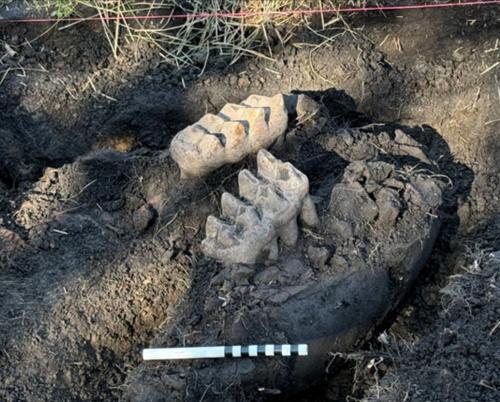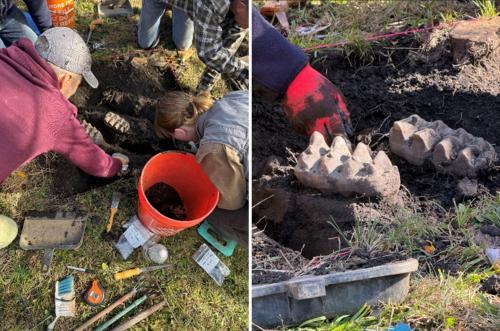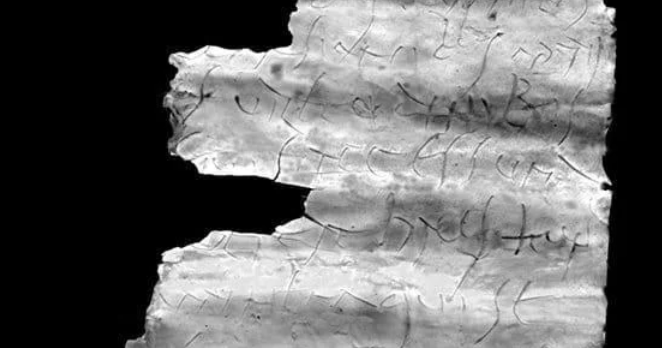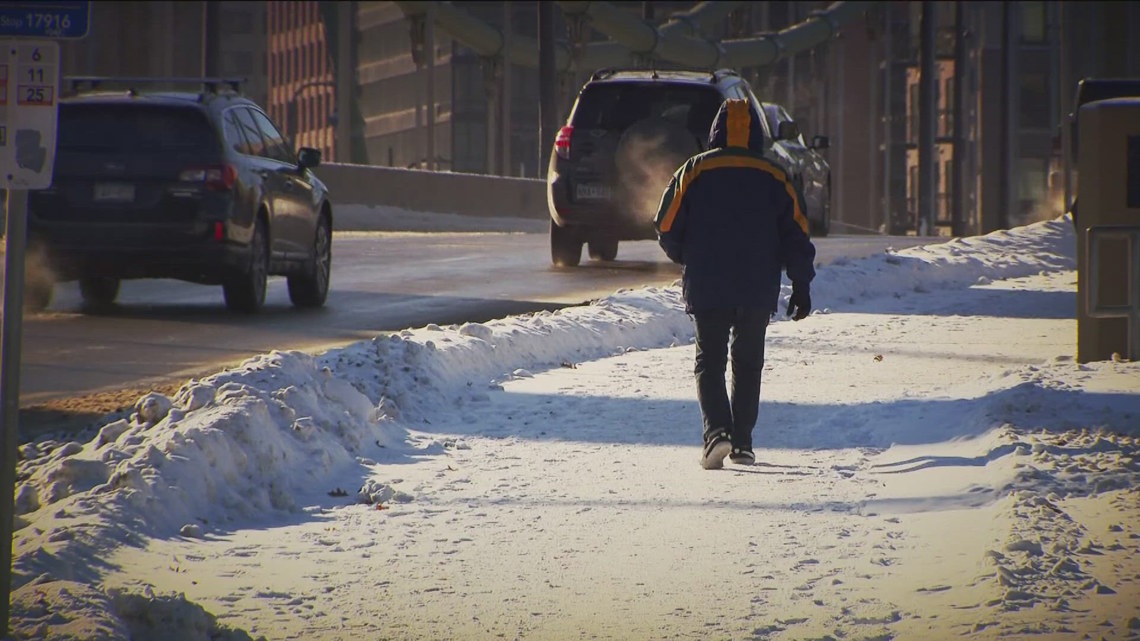CBS News
Complete mastodon jaw unearthed in New York after homeowner spots teeth in backyard

A complete mastodon jaw was discovered in the backyard of a home in New York’s Hudson Valley, marking the state’s first such find in more than a decade, officials announced this week.
The Stockton, New York, homeowner initially spotted two teeth hidden in the fronds of a plant on their property and proceeded to uncover two more teeth buried inches underground, the New York State Museum said. Staff from the museum, which is based in Albany and has an archaeological research department, and SUNY Orange launched an investigation at the property.
New York State Museum
Their excavation unearthed additional fossils, including a full, well-preserved adult jaw and fragments of rib and toe bones that once belonged to a mastodon — ancient giants that existed during the Ice Age and became extinct some 10,000 years ago. The term refers to a group of massive elephant-like species, like the mammoth.
“When I found the teeth and examined them in my hands, I knew they were something special and decided to call in the experts,” said the homeowner in a statement to the New York State Museum. “I’m thrilled that our property has yielded such an important find for the scientific community.”
New York State Museum
Remnants of mastodons have been discovered in New York before. According to the museum, more than 150 fossils of these prehistoric creatures have been documented to date statewide, with around one-third of them coming from Orange County, where the latest bones were found.
But experts said the findings offer an opportunity to learn something new.
“This discovery is a testament to the rich paleontological history of New York and the ongoing efforts to understand its past,” said Robert Feranec, a research director and curator at the New York State Museum whose work centers on ice age animals, in a statement. “Fossils are resources that provide remarkable snapshots of the past, allowing us to not only reconstruct ancient ecosystems but also provide us with better context and understanding of the current world around us.”
The mastodon fossils will undergo carbon dating and analysis to determine the creature’s age, diet and habitat while it was alive, the museum said. After that analysis and subsequent preservation work are complete, the bones will be featured on public display in 2025.
CBS News
Supreme Court takes up South Carolina’s effort to defund Planned Parenthood
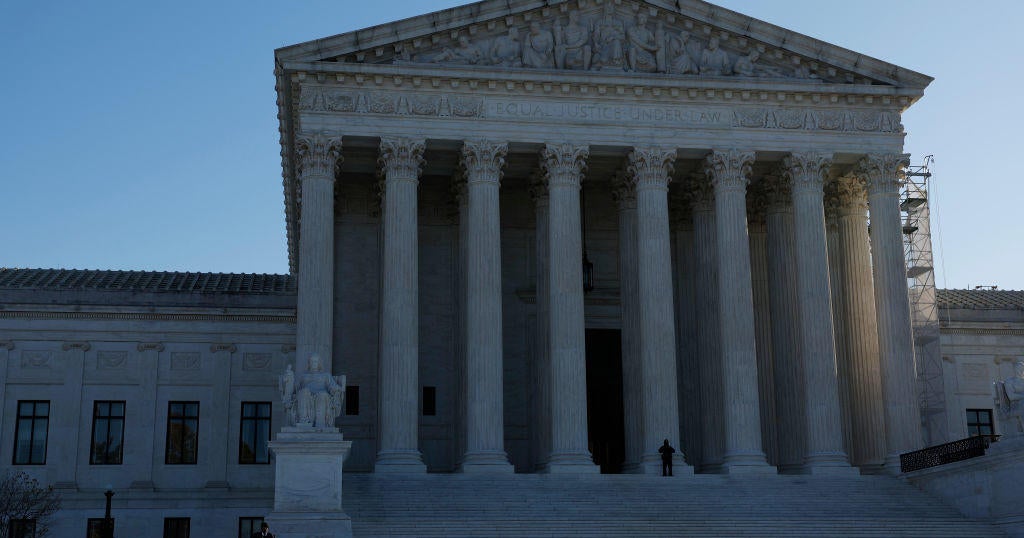
Washington — The Supreme Court on Wednesday agreed to consider South Carolina health department’s effort to cut off funding from Planned Parenthood because it performs abortions, wading into another dispute over access to the procedure in the wake of its reversal of Roe v. Wade.
The case, known as Kerr v. Edwards, stems from the state’s decision in 2018 to end Planned Parenthood South Atlantic’s participation in its Medicaid program. Gov. Henry McMaster, a Republican, directed the South Carolina Department of Health and Human Services to deem abortion clinics unqualified to provide family planning services and end their Medicaid agreements.
Planned Parenthood operates two facilities in the state, one in Charleston and the other in Columbia, and provides hundreds of Medicaid patients with services like physicals, cancer and other health screenings, pregnancy testing and contraception. Federal law prohibits Medicaid from paying for abortions except in cases of rape or incest, or to save the life of the mother.
Planned Parenthood and one of its patients, Julie Edwards, sued the state, arguing that cutting off its funding violated a provision of the Medicaid Act that gives beneficiaries the right to choose their provider.
A federal district court blocked South Carolina from ending Planned Parenthood’s participation in its Medicaid program, and a U.S. appeals court upheld that decision, finding that Edwards could sue the state to enforce the Medicaid Act’s free-choice-of-provider requirement.
The legal battle has already been before the Supreme Court in the past, with the high court last year ordering additional proceedings after deciding in a separate case that nursing home residents could sue their state-owned health care facility over alleged violations of civil rights.
After reconsidering its earlier decision, the three-judge appeals court panel ruled unanimously in March that Edwards’ lawsuit against the state could go forward and said South Carolina couldn’t strip Planned Parenthood of state Medicaid funds.
“This case is, and always has been, about whether Congress conferred an individually enforceable right for Medicaid beneficiaries to freely choose their healthcare provider. Preserving access to Planned Parenthood and other providers means preserving an affordable choice and quality care for an untold number of mothers and infants in South Carolina,” Judge Harvie Wilkinson wrote for the 4th Circuit panel.
South Carolina officials asked the Supreme Court to review that decision, marking the third time the case has been before the justices. The justices agreed to take up the question of whether “the Medicaid Act’s any-qualified provider provision unambiguously confers a private right upon a Medicaid beneficiary to choose a specific provider.”
South Carolina is among the more than two dozen that have passed laws restricting access to abortion in the wake of the Supreme Court’s June 2022 decision reversing Roe v. Wade. In South Carolina, abortion is outlawed after six weeks of pregnancy with some exceptions.
Several states have also enacted laws blocking Planned Parenthood from receiving Medicaid funding, including Arkansas, Missouri, Mississippi and Texas.
CBS News
Lithium battery fires on U.S. flights now occur nearly twice a week, according to new FAA data

As millions prepare to fly for the holidays, the Federal Aviation Administration is warning travelers about a hidden danger in their luggage: lithium-ion batteries. Found in everyday devices like laptops, tablets and even electric toothbrushes, these batteries can catch fire if they overheat or are damaged.
Last July, panic erupted on an American Airlines flight from San Francisco to Miami after a laptop battery in a carry-on bag ignited.
“It was absolute chaos. It truly felt like every man for themselves. And it was terrifying,” said Shilpa Patel, a passenger on the flight. “I don’t know if we’re going to explode. All I know is I need to get out and I need to survive.”
FAA data shows that lithium battery fires on U.S. flights have risen 388% since 2015, now occurring nearly twice a week.
“Any fire at 30,000 feet is unacceptable,” said David Wroth of UL Standards & Engagement, a safety research organization.
A survey of more than 800 flight attendants conducted by UL found that 87% are concerned about lithium battery risks on airplanes, and more than a third believe airlines should do more to ensure passenger safety. While the FAA requires airlines to include general safety information in preflight announcements, those warnings often don’t address the specific risk of battery fires.
“It’s a balance we probably need to do a better job striking with the airlines,” said Ben Supko, who oversees hazardous materials safety for the FAA. “Passengers don’t fully understand how serious the risk is.”
Supko said passengers need to monitor devices during a flight and immediately notifying the crew if a device becomes warm, discolors, or bulges. Passengers are also warned not to pack lithium batteries in checked luggage, as fires in the cargo hold are harder to extinguish.
“When you don’t know what’s going to happen, you act erratically,” said Patel. “It costs us nothing just to say, ‘Hey, the reason why we’re so serious about this is because it could be really dangerous. It could catch fire.'”
The UL survey also found that one in four passengers admits to packing lithium batteries in their checked bags. It is a dangerous practice for one reason in particular: It would be even harder to put out a fire in the plane’s cargo hold.
CBS News reached out to American Airlines regarding the incident at the San Francisco airport and potential updates to its safety announcements. The airline did not address the question directly but stated that its flight attendants receive thorough and ongoing training to handle emergencies onboard.
CBS News
Eye Opener: Update on possible motives in Wisconsin school shooting

Watch CBS News
Be the first to know
Get browser notifications for breaking news, live events, and exclusive reporting.


